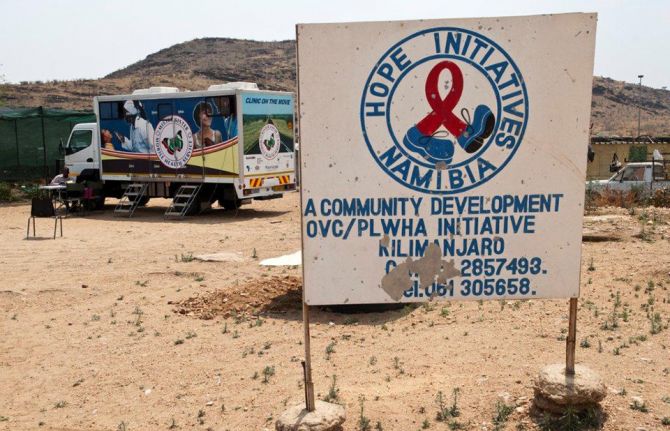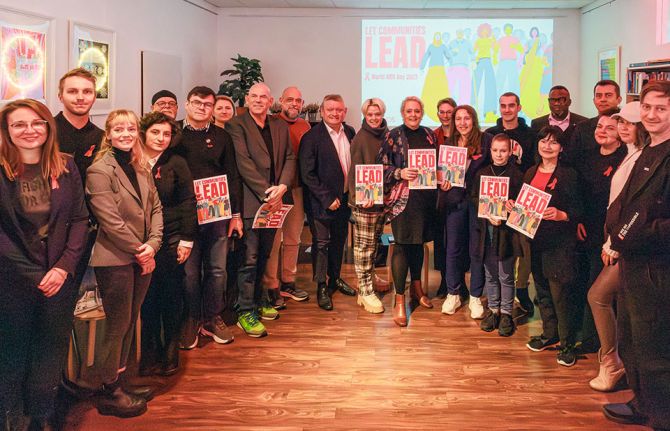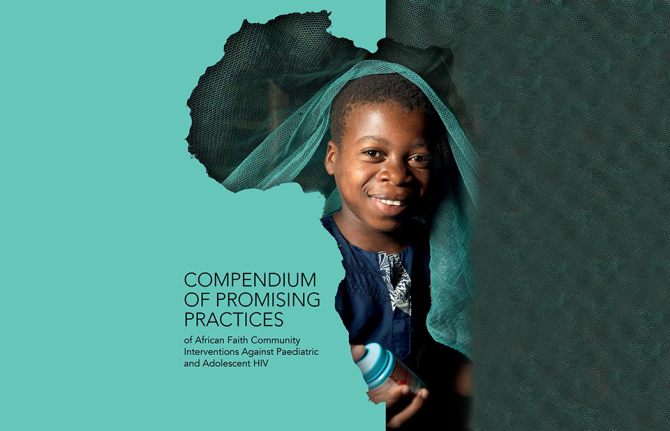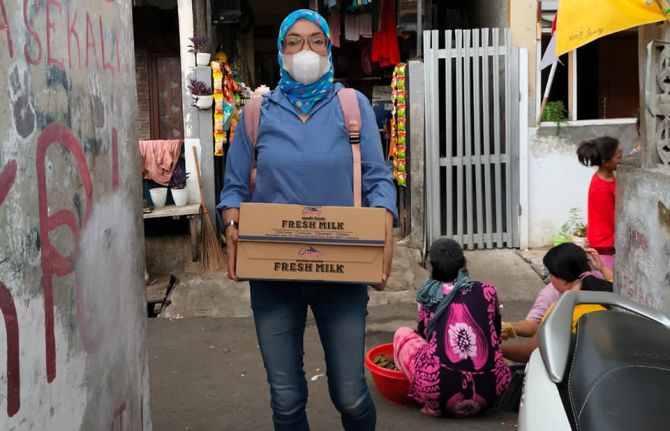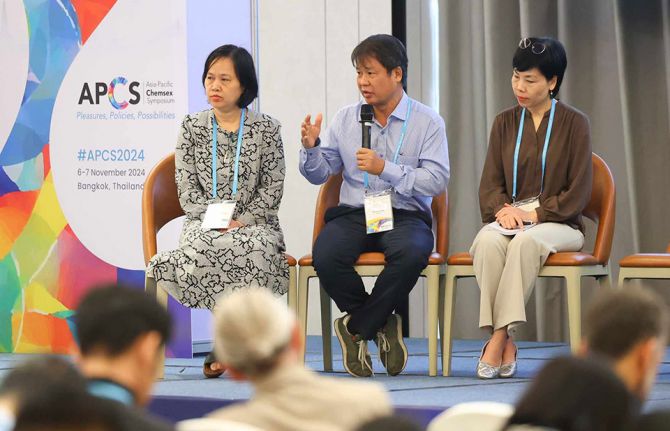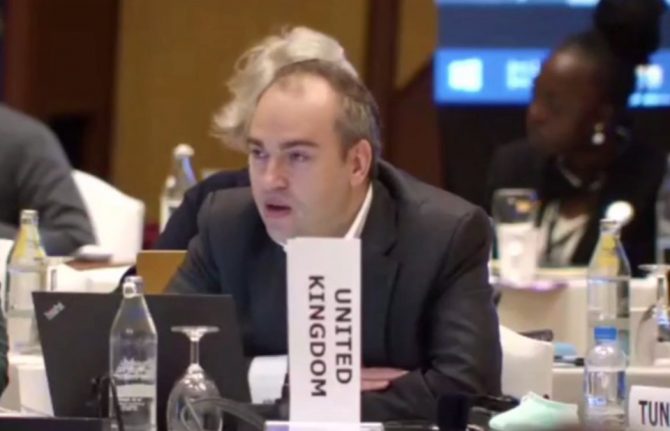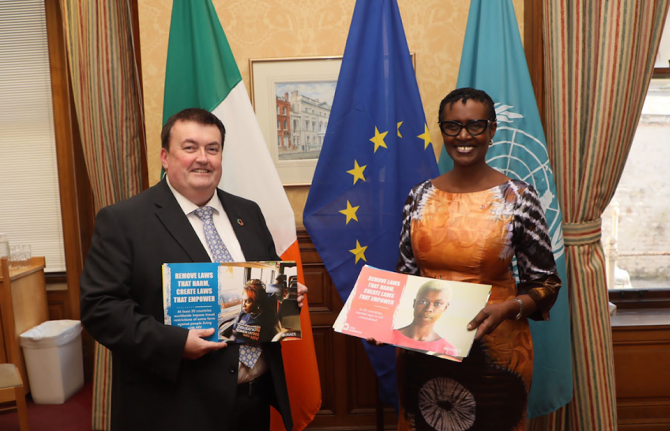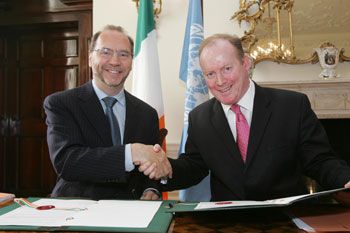IRL

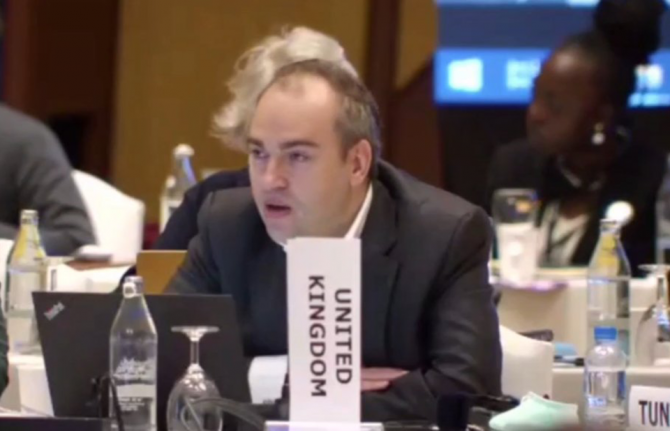
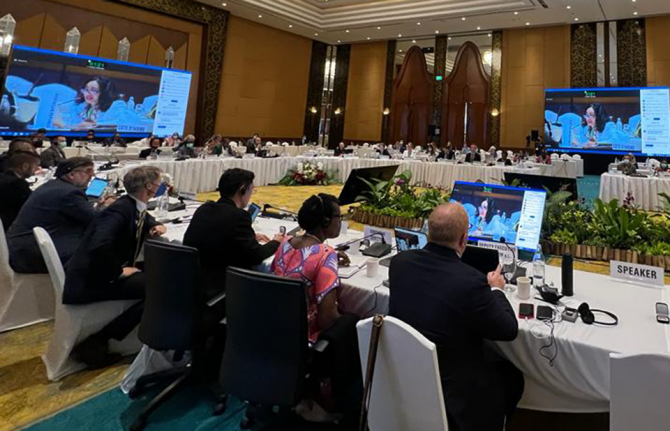
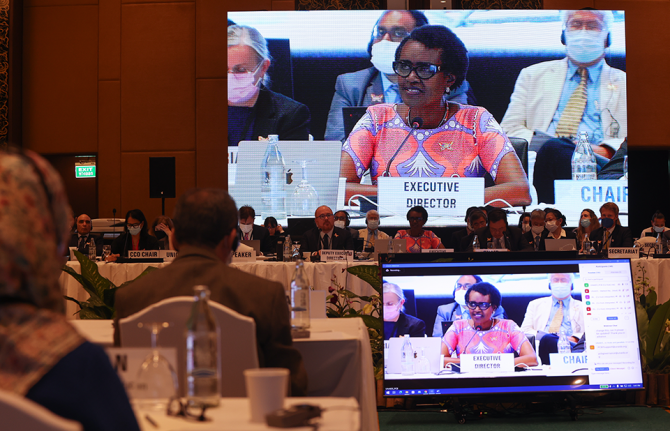
Press Statement
UNAIDS welcomes strong funding commitments from the United Kingdom and from Ireland
13 December 2022 13 December 2022CHAING MAI/GENEVA, 13 December 2022—UNAIDS welcomes confirmation from the United Kingdom that it will be increasing its funding to UNAIDS from £2.5 million in 2021 to £8 million in 2022.
UNAIDS also welcomes plans being finalized for a multi-year funding agreement between UNAIDS and Ireland for the period 2023 to 2026.
In recent weeks, a series of donors have been announcing funding commitments to UNAIDS.
The decisions were shared at the 51st meeting of UNAIDS Programme Coordinating Board being held in Chaing Mai, Thailand, and will help provide to secure predictable and timely funding to UNAIDS to enable UNAIDS to deliver on the Global AIDS Strategy 2021-2026.
“We warmly welcome the United Kingdom’s decision to announce further funding to UNAIDS, and Ireland’s multi-year commitment, which underscore both countries’ bold commitment to end AIDS and tackle the inequalities that continue to drive the pandemic,” said the Executive Director of UNAIDS Winnie Byanyima. “The United Kingdom and Ireland are valued and steadfast partners to UNAIDS, and their support allows us to provide the leadership and coordination that the global HIV response requires at this critical time.”
Both the United Kingdom and Ireland share UNAIDS commitment to an equality based, evidence driven approach to ending AIDS which champions the rights of women, girls and the key populations most vulnerable to HIV infection.
Thank you to the United Kingdom for contributing a further £8 million to UNAIDS.
— UNAIDS (@UNAIDS) December 13, 2022
We are grateful for the UK's partnership and support, and for their commitment to the AIDS response. #PCB51 pic.twitter.com/tnd61NKWoi
We are pleased to be finalizing a multi-year funding agreement with Ireland, as announced at #PCB51.
— UNAIDS (@UNAIDS) December 13, 2022
Thank you Ireland for your support and your longstanding commitment to the AIDS response. Together we can #endAIDS by 2030! pic.twitter.com/pLAwYjR631
UNAIDS
The Joint United Nations Programme on HIV/AIDS (UNAIDS) leads and inspires the world to achieve its shared vision of zero new HIV infections, zero discrimination and zero AIDS-related deaths. UNAIDS unites the efforts of 11 UN organizations—UNHCR, UNICEF, WFP, UNDP, UNFPA, UNODC, UN Women, ILO, UNESCO, WHO and the World Bank—and works closely with global and national partners towards ending the AIDS epidemic by 2030 as part of the Sustainable Development Goals. Learn more at unaids.org and connect with us on Facebook, Twitter, Instagram and YouTube.

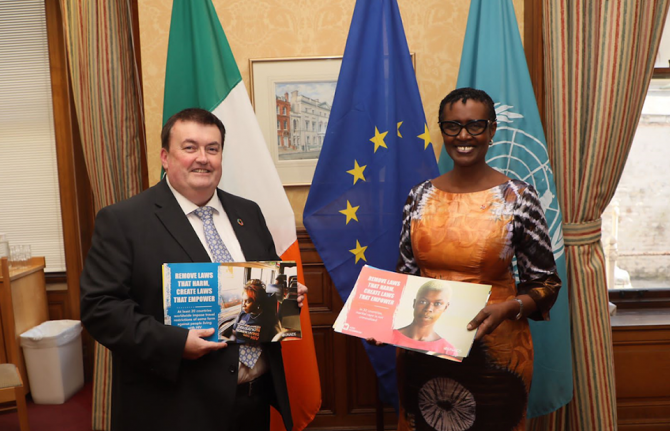
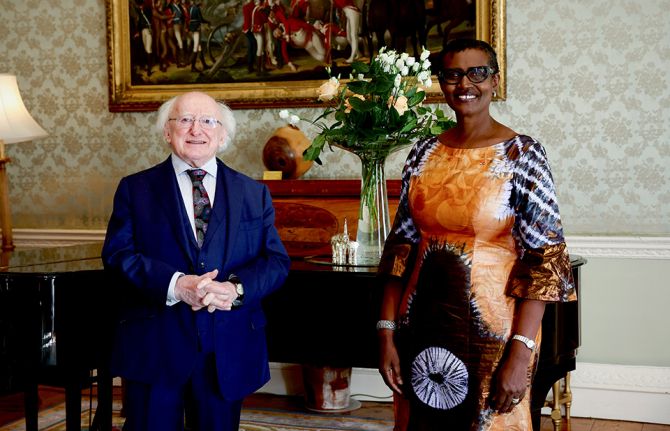
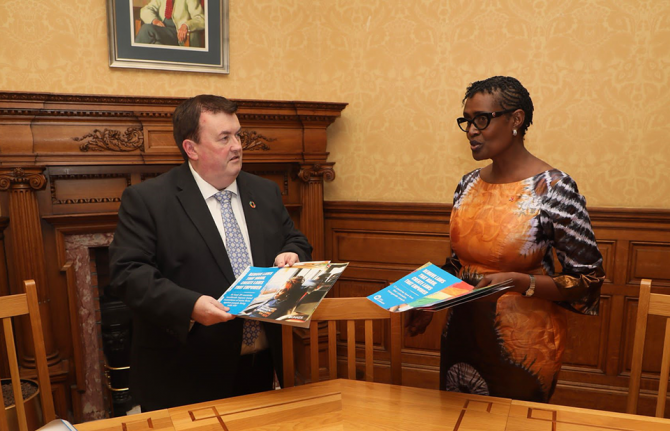
Press Release
On Zero Discrimination Day, Ireland and UNAIDS strengthen their partnership to end the AIDS pandemic
01 March 2022 01 March 2022DUBLIN/GENEVA, 1 March 2022—Ireland has today announced that it is increasing its core funding for UNAIDS from €2.4 million in 2021 to €2.5 million in 2022. The announcement was made at a meeting in Dublin between Ireland’s Minister for Overseas Development Aid and Diaspora, Colm Brophy, and the Executive Director of UNAIDS, Winnie Byanyima.
Ireland has been a partner and supporter of UNAIDS for more than 20 years. It has supported programmes that reduce the impact of HIV among some of the most-at-risk groups, including gay men and other men who have sex with men and young women and girls. In addition to the €2.4 million contribution in 2021, Ireland provided €1 million in support of UNAIDS’ zero discrimination agenda.
“Ireland is a strong leader in the global AIDS response and continues to be a steadfast ally to UNAIDS,” said Ms Byanyima. “This additional financial contribution from Irish Aid is an important signal at a time when the world must step up its efforts to remove laws that harm and instead create laws that empower so that people can receive life-saving and life-changing HIV services.”
This year on Zero Discrimination Day, which is being held under the theme “Remove laws that harm, create laws that empower”, UNAIDS is highlighting the urgent need to take action against discriminatory laws. In many countries, laws result in people being treated differently, excluded from essential services or being subject to undue restrictions on how they live their lives, simply because of who they are, what they do or who they love. Such laws are discriminatory—they deny human rights and fundamental freedoms.
On Zero Discrimination Day, 1 March, we celebrate the right of everyone to live a full and productive life—and live it with dignity and free from discrimination.
UNAIDS
The Joint United Nations Programme on HIV/AIDS (UNAIDS) leads and inspires the world to achieve its shared vision of zero new HIV infections, zero discrimination and zero AIDS-related deaths. UNAIDS unites the efforts of 11 UN organizations—UNHCR, UNICEF, WFP, UNDP, UNFPA, UNODC, UN Women, ILO, UNESCO, WHO and the World Bank—and works closely with global and national partners towards ending the AIDS epidemic by 2030 as part of the Sustainable Development Goals. Learn more at unaids.org and connect with us on Facebook, Twitter, Instagram and YouTube.
Region/country

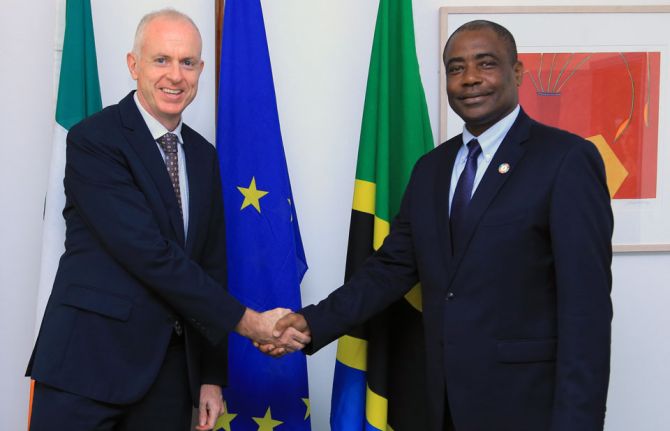
Feature Story
Ireland to support HIV services for the most vulnerable in the United Republic of Tanzania
14 December 2018
14 December 2018 14 December 2018Ireland has pledged €400 000 to UNAIDS for a project to provide HIV services for the most vulnerable populations in the United Republic of Tanzania, with the first tranche, €200 000, already received.
“Through our development programmes, Ireland supports the most marginalised in society to access key services so that they can live with dignity. Ireland is pleased to collaborate with UNAIDS to improve the plight of populations that are in most need of timely HIV services,” said the Irish Ambassador to the United Republic of Tanzania, Paul Sherlock.
UNAIDS will work in close collaboration with the Ministry of Health, the Benjamin Mkapa Foundation and civil society organizations to address issues that hinder the most vulnerable populations from accessing HIV prevention, treatment and care in a timely manner. Support that UNAIDS will provide includes convening stakeholders, providing technical leadership and strategic guidance and ensuring participation and representation.
Stigma and discrimination, inequality and violence against women and girls and criminal and punitive laws that affect vulnerable populations remain among the major barriers to an effective response to HIV in the country.
The 18-month project will help its beneficiaries with legal literary skills, raise awareness on the right to health and address HIV-related stigma and discrimination.
Ireland is a long-standing partner of UNAIDS, providing US$ 2.56 million in core funding to UNAIDS in 2018.
“UNAIDS and Ireland share a goal of ensuring that the AIDS response leaves no one behind. The funding from Ireland offers us a timely opportunity to give the most vulnerable populations in the United Republic of Tanzania a chance to live in dignity and good health,” said Leopold Zekeng, UNAIDS Country Director, United Republic of Tanzania.

Feature Story
4th Global Partners Forum on Children Affected by HIV and AIDS
08 October 2008
08 October 2008 08 October 2008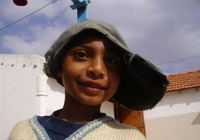
200 delegates from 42 countries met in Dublin, Ireland on the 6th and 7th October 2008 for the 4th Global Partners Forum on Children affected by HIV and AIDS.
Credit: UNAIDS
In order to review progress, set global priorities, and make commitments for children affected by HIV, 200 delegates from 42 countries including leaders in government, civil society and UN agencies met in Dublin, Ireland on the 6th and 7th October 2008 for the 4th Global Partners Forum on Children affected by HIV and AIDS.
The Global Partners Forum was established in 2003 to build momentum in fulfilling global commitments for children affected by HIV as was stated in the United Nations General Assembly 2001 Declaration of Commitment on HIV/AIDS and the Millennium Development Goals.
The current definition of children affected by HIV (UNICEF and UNAIDS) are those under 18 years of age who are living with HIV or have lost one or both parents due to AIDS or whose survival, well-being or development is threatened or altered by HIV. However, in hyperendemic countries where HIV prevalence exceeds 15% most children are directly or indirectly affected by AIDS.
According to the latest UNAIDS report on the global AIDS epidemic, the number of children living with HIV has increased from 1.6 million in 2001 to 2 million in 2007, 90% of which live in sub-Saharan Africa where nearly 12 million children under 18 have lost one or both parents to AIDS.
The 4th Global Partners Forum, co-hosted by the Government of Ireland, UNICEF and UNAIDS, aimed to renew the commitment of international partners to accelerate support for the protection and care of children affected by HIV, report progress and highlight good practices identified since the 3rd Global Partners Forum in 2006, as well as to produce a participant-endorsed communiqué defining priorities for the next two years.
The meeting was opened by the Minister of State for Overseas Development, Peter Power, T.D. and a keynote address was given by An Taoiseach Brian Cowen, the Prime Minister. Other keynote speakers included the First Lady of Honduras Xiomara Castro de Xelaya, and HIV activist and singer/songwriter Annie Lennox. The meeting differed from many others by the presence and active contribution of children from western and eastern Europe, Asia, Africa, and Latin America, including some infected and affected by HIV.

Despite efforts to care and protect vulnerable children, exclusion, stigma, and discrimination of children affected by HIV continue to be common challenges in most countries.
Credits: UNAIDS
Children’s vulnerability to the epidemic was captured in the evidence-based synthesis paper presented at the forum by UNICEF to promote awareness and to inform the discussions. Priority issues were further elaborated during panel discussions addressing topics such as family-centered care, strengthening national responses for the most vulnerable children, and quality programming at the community level. Although it was acknowledged that there has been progress in global efforts for children affected by HIV, it was also recognized the severe remaining constraints which make it impossible for some children to realize their human rights.
Evidence from the synthesis paper and discussions at the forum, including contributions from the children, highlighted that despite efforts to care and protect vulnerable children, exclusion, stigma, and discrimination of children affected by HIV continue to be common challenges in most countries. Stigma has been cited as a reason for children not being enrolled in school, receiving care, or being adequately served by programmatic responses.
Attending school is essential to the development of skills and acquisition of knowledge to enable young people to reach economic and social fulfillment. Schools also have the protective effect of educating children about HIV and how to avoid infection. However, HIV poses several constraints that prevent children from going to school or forces them to an early drop out. For instances, many children become responsible for the care of their siblings and other family members when parents are debilitated by poor health. The need to provide food or generate income prevents these children from attending school while at the same time increasing their vulnerability to HIV. This vulnerability represents part of a vicious cycle: their circumstances put them at high risk for exploitation and abuse, and therefore exposure to HIV.
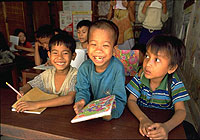
Schools also have the protective effect of educating children about HIV and how to avoid infection. Credit: UNAIDS
Evidence presented at the 4th Global Partners Forum showed that families are bearing the bulk of the costs for infected children. Therefore, families under stress through chronic poverty, labor constrains and facing the impact of illness and death, need external assistance. In response to these challenges, a number of countries are beginning to scale up cash transfers, as part of a social protection package, to alleviate poverty and to increase access to essential services. Such social protection has been shown to be feasible even in resource-constrained countries with high HIV burdens.
Even though the main mode of HIV transmission, and the extent of HIV-related vulnerability among children may differ from region to region, the response challenges were seen to be the same, such as fear of HIV testing by parents, lack of access to treatment for children, and lack of social and psychological support.
The messages of the meeting and the action points were summarized by a communiqué which was presented, debated and adopted during the plenary. It recognized that more information and data were now available and the reality on the ground is better understood to inform action. Based on the evidence presented, the communiqué highlighted four priority action points: the well-being of children and parents infected by HIV; strengthening families and communities as units of prevention, treatment, care and support; increasing effectiveness of programs, services and resources; and human rights for vulnerable children.
Participants committed themselves to implementing the action points of the communiqué, to monitor their progress, and to hold themselves accountable to children affected by HIV. UNAIDS committed to work with governments, the UN family and civil society to put children and families at the heart of the response to HIV through efforts at global, regional and country level.
4th Global Partners Forum on Children Affected by
Cosponsors:
Partners:
Unite For Children. Unite Against AIDS
Press centre:
Speech by Paul De Lay, UNAIDS Director, Epidemic Monitoring and Prevention Department - 4th Global Partners Forum on Children affected by HIV (pdf, 42 kb)
Read final communique (pdf, 53 kb)
Publications:
2008 report on the global AIDS epidemic
Children and AIDS - Second Stocktaking report (pdf, 2.5 Mb)

Feature Story
UNAIDS Executive Director visits Ireland
31 January 2007
31 January 2007 31 January 2007UNAIDS Executive Director was in Dublin, Ireland on Tuesday 30th January to sign with Conor Lenihan TD, Minister of State for Irish Aid, a new €30 million, five year partnership between Ireland and UNAIDS. The agreement strengthens Ireland's commitment to the response to AIDS and confirms its leading position in the global response. The Minister of State for Irish Aid, Conor Lenihan TD, and UNAIDS Executive Director, Dr Peter Piot, also met with fourteen Irish Aid sponsored UN Volunteer (UNV) Interns who will travel overseas next week to work in the developing world for a period of one year.
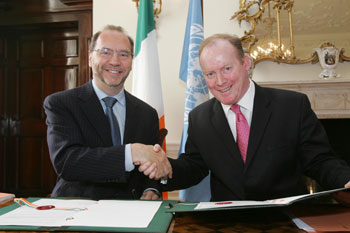 |
The Minister of State for Irish Aid, Mr. Conor Lenihan TD with UNAIDS Executive Director, Dr. Peter Piot signing the partnership agreement between Ireland and UNAIDS, in Dublin on Tuesday 30th January. |
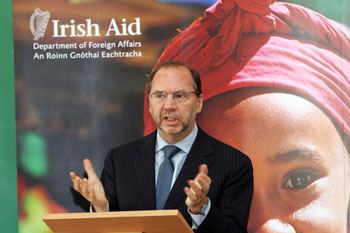 |
During his visit to Ireland on Tuesday 30th January, UNAIDS Executive Director, Dr. Peter Piot, met with a group of fourteen Irish Aid sponsored UN Volunteer (UNV) who will travel overseas next week to work in the developing world for a period of one year. |
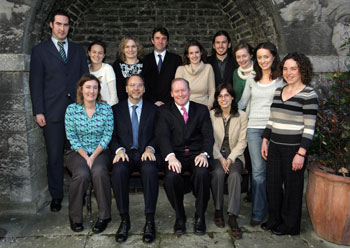 |
UNAIDS Executive Director, Dr. Peter Piot and the Minister of State for Irish Aid, Mr. Conor Lenihan TD with the fourteen UN Volunteers (UNV) that Irish Aid is sponsoring to work with different UN agencies in Africa, Latin America and Asia. |
 |
UNAIDS Executive Director, Dr.Peter Piot talks to one of the fourteen Irish Aid sponsored UN Volunteer (UNV), Ms. Caragh Munn, who will work in the area of social development with UNAIDS in Ethiopia. |
All photo credit : Maxwells Photography
Links:
Read Press Release
Read more on Ireland's 'Stamp Out Stigma' campaign

Feature Story
Ireland to Stamp out Stigma
30 January 2007
30 January 2007 30 January 2007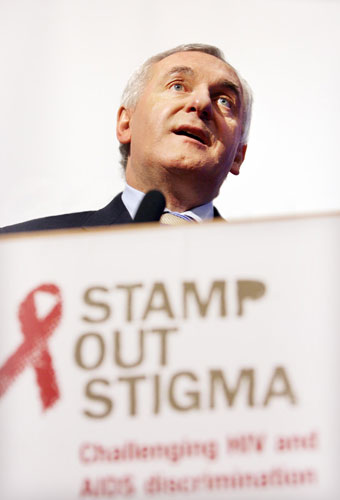
Ireland is pledging to “Stamp out” AIDS-related stigma and discrimination in Ireland as part of a national campaign launched by Irish Prime Minister Bertie Ahern on December 1 2006.
The goal of this public awareness campaign is to improve the understanding of HIV and the issues that HIV positive people have to deal with, it also aims at reducing AIDS-related in the workplace and in promoting safer environments for people to disclose their status and access necessary services. The one-year campaign is a joint initiative of the Irish Department of Health and Children and the Department of Foreign Affairs
“Each year on 1 December, the world comes together in solidarity with the millions of men, women and children who are living with HIV and we remember our obligation to act now and to live up to the ambitious international commitments we have made,” said Prime Minister Ahern when launching the campaign on World AIDS Day.
The campaign will feature a number of activities in 2007 such as the development an anti-stigma advertisement to be screened on national television, through national cinemas and on the internet. “Stamp out Stigma” will involve a wide variety of partners in the AIDS response including the media sector, with the aim of encouraging responsible, non-stigmatizing reporting on AIDS in both print and broadcast media throughout Ireland. Activities and lobbying will also take place to promote the Employment Equality Act 1998 and the Equal Status Acts 2000 and 2004 which prohibit all forms of discrimination in the workplace on the basis of HIV status.
“We must all work together to make our societies more open and caring, more inclusive and less judgmental,” said Prime Minister Ahern.
Related
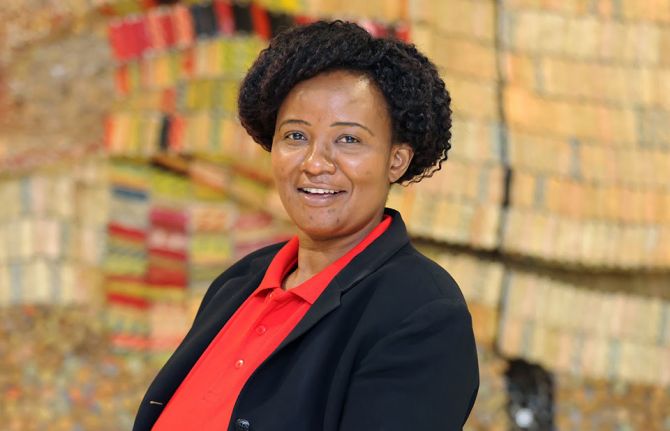 Evelyn Siula: A journey of strength and solidarity
Evelyn Siula: A journey of strength and solidarity
18 November 2024


